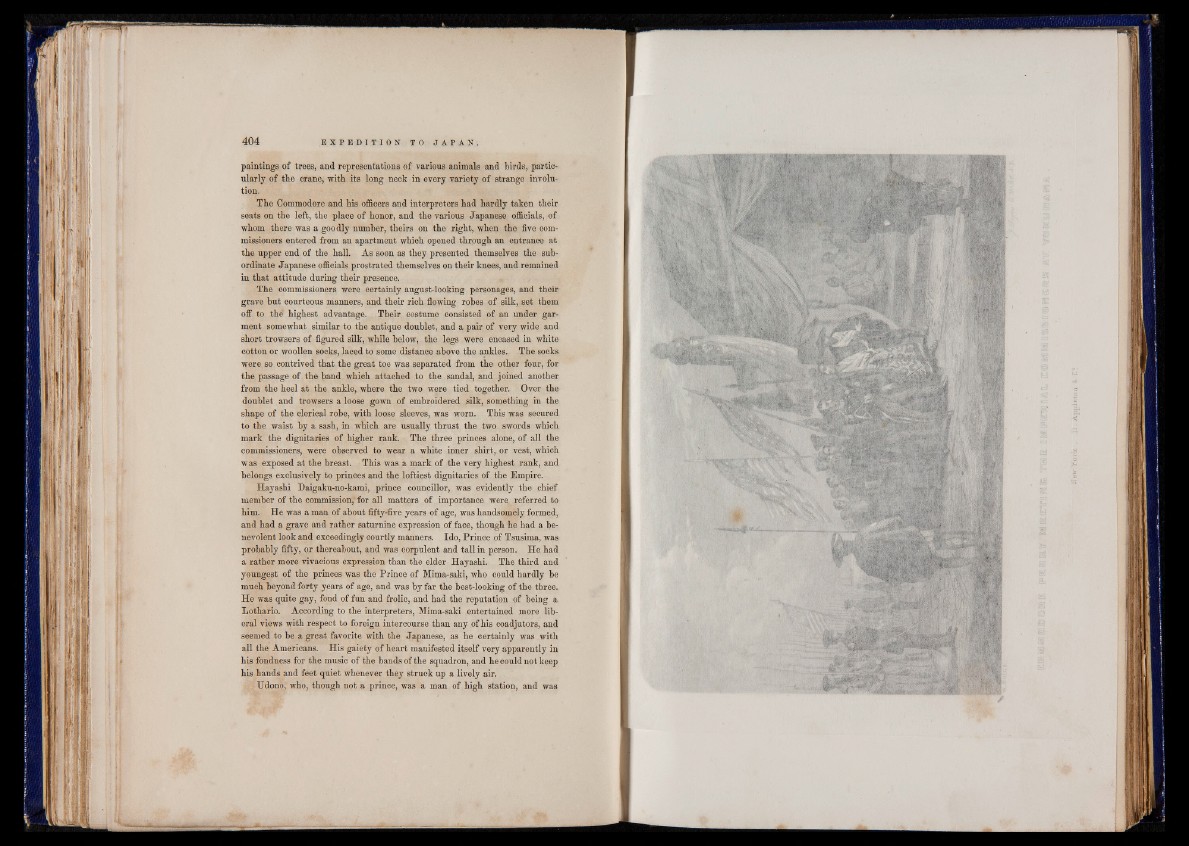
paintings of trees, and representations of various animals and birds, particularly
of the crane, with its long neck in every variety of strange involution,
The Commodore and his officers and interpreters had hardly taken their
seats on the left, the place of honor, and the various Japanese officials, of
whom there was a goodly number, theirs on the right, when the five commissioners
entered from an apartment which opened through an entrance at
the upper end of the hall. As soon as they presented themselves the subordinate
Japanese officials prostrated themselves on their knees, and remained
in that attitude during their presence.
The commissioners were certainly august-looking personages, and their
grave but courteous manners, and their rich flowing robes of silk, set them
off to the’ highest advantage. Their costume consisted of an under garment
somewhat similar to the antique doublet, and a pair of very wide and
short trowsers of figured silk, while below, the legs were encased in white
cotton or woollen socks, laced to some distance above the ankles. The socks
were so contrived that the great toe was separated from the other four, for
the passage of the band which attached to the sandal, and joined another
from the heel at the ankle, where the two were tied together. Over the
doublet and trowsers a loose gown of embroidered silk, something in the
shape of the clerical robe, with loose sleeves, was worn. This was secured
to the waist by a sash, in which are usually thrust the two swords which
mark the dignitaries of higher rank. The three princes alone, of all the
commissioners, were observed to wear a white inner shirt, or vest, which
was exposed at the breast. This was a mark of the very highest rank, and
belongs exclusively to princes and the loftiest dignitaries of the Empire.
Hayashi Daigaku-no-kami, prince councillor, was evidently the chief
member of the commission, for all matters of importance were referred to
him. He was a man of about fifty-five years of age, was handsomely formed,
and had a grave and rather saturnine expression of face, though he had a benevolent
look and exceedingly courtly manners. Ido, Prince of Tsusima, was
probably fifty, or thereabout, and was corpulent and tall in person. He. had
a rather more vivacious expression than the elder Hayashi. The third and
youngest of the princes was the Prince of Mima-saki, who could hardly be
much beyond forty years of age, and was by far the best-looking of the three.
He was quite gay, fond of fun and frolic, and had the reputation of being a
Lothario. According to the interpreters, Mima-saki entertained more liberal
views with respect to foreign intercourse than any of his coadjutors, and
seemed to be a great favorite with the Japanese, as he certainly was with
all the Americans. His gaiety of heart manifested itself very apparently in
his fondness for the music of the bands of the squadron, and he could not keep
his hands and feet quiet whenever they struck up a lively air.
Udono, who, though not a prince, was a man of high station, and was